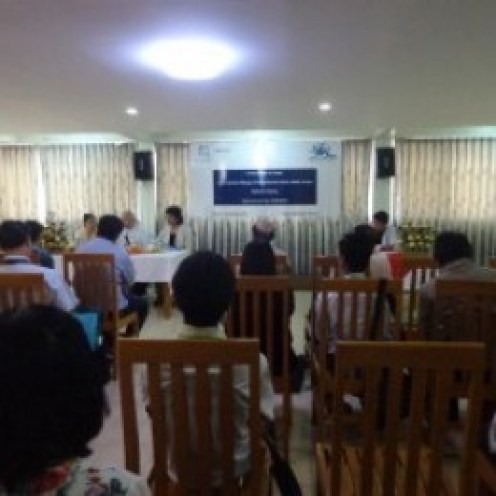Although Burma is making progress in its transition to democracy, there is yet to be full media freedom in the country, stated U Khin Maung Lay, temporary Vice-Chairman of the Myanmar Journal Council (MJC), at the Editorial Training of Online Media for Peace and Cross-Cultural Dialogue among Ethnic Media Groups.
The 5-day training that began on 19th December is supported by the United Nations Educational, Scientific, and Cultural Organization (UNESCO) and has been organized by Burma News International (BNI). It is being held at the Frame Hotel in Rangoon.

U Khin Maung Lay said: “The history of Burma’s newspapers is great. We had a fully free press in the era of Mindon Min [1853-1878] but in this democratic period, why can't we have a free press?"
He added that the media is vitally important to Burma’s democratic transition, having been banned and censored for several decades. The country will only develop with the dissemination of true news and information. If the country wants to become developed, the public should receive factual information regarding developments and projects taking place throughout the country.
“The development of ethnic media is a supporting this [democratic] transition. We believe that journalists are the only ones who can provide the public with factual and true information and knowledge to guide them on their way,” said U Khin Maung Lay.
Attendees at the editorial training included the BNI board of directors, namely Nan Paw Gay, Nai Kasauh Mon, and Ko Khin Mya Kyaw, and several BNI staff members, as well as Ko Myint Kyaw of the Myanmar Journalist Network (MJN), Daw May Thingyan Hein of the Myintmakha, and Min Chan Hteik of the Myanmar Journalism Institute (MJI).
Sixteen trainees from domestic-based media groups and exiled media groups are also attending the training, including Kachin, Karen, Karenni, Chin, Mon, Arakan, and Shan news agencies.
The objectives of the training are to enable ethnic media groups to become a part of the main stream media, to build networks among ethnic media groups, and to produce qualified journalists from ethnic media groups, along with the main stream media.
Ms. Raheela K. Chaudhry of UNESCO Myanmar said that at present, ethnic media makes up only ten percent of the country’s national media. Ms. Raheela K. Chaudhry stated that Burma can only move forward towards development if there is peace in the country, noting that media is an important sector in achieving peace.
Although the U Thein Sein government has granted licenses to private groups for newspaper and journal publications, the government has yet to grant licenses for radio and TV channels.
Despite the current administration’s declared commitment to a free press in Burma, journalists continue to be arrested and killed.
During a Human Rights Watch (HRW) visit to Nay Pyi Taw, HRW’s executive director Kenneth Roth requested that President Thein Sein’s government accept the media’s criticism rather than prosecuting them as criminals.



